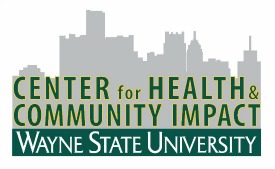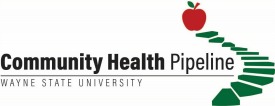


The Wayne State University Center for Health and Community Impact (CHCI) will host the 2018 Youth Food Summit in collaboration with Detroit Public Schools Community District’s (DPSCD) Office of School Nutrition and the Detroit Food Policy Council. This is the first year that Wayne State University has been a part of the Youth Food Summit, and it will host the event for over 250 youth on Oct. 19, 2018. Activities will include youth-developed presentations and breakout sessions that focus on student involvement in the Detroit food system.
The event will bring Detroit high school students together to share their experiences from working in one of 20 local food, nutrition or health organizations as part of the WSU Community Health Pipeline (CHP) and Keep Growing Detroit. Winona Bynum, executive director of the Detroit Food Policy Council, recognizes the importance of the Youth Food Summit. “In order to grow a food-secure community, it's important that our young people understand the economic sectors involved in our food system and have pathways to careers in those sectors,” she said. “The Detroit Youth Food Summit exposes them to the system behind our food and lets them know that they can have an impact on what that system looks like for future generations.”
Yolanda Scarborough, program director of the Detroit Food Academy, will provide a keynote address on the role of youth in the local food system. A panel of local food system professionals including Keep Growing Detroit farmer Akello Karamoko, food policy activist Amy Kuras, WIC Program Manager Velonda Anderson, and DPSCD District Chef Kevin Frank will provide insight on career paths in the Detroit food system. Chef Frank will also prepare a hearty, in-season meal for attendees while Illuminate Literacy Entrepreneurs enlightens youth with a slam poetry performance.
Wayne State’s CHP team has worked with the youth presenters to create engaging workshops based on summer apprenticeships in local food system organizations. Topics include smoothie making, seed planting, healthy snack packs and garden maintenance. Youth will highlight experiences working at Keep Growing Detroit and the Wayne State University Farmers Market, and will hear from Wayne State groups such as Deeply Rooted and The W Food Pantry. Participants will leave with information on initiatives in their community, engagement events, and work opportunities and career options in the Detroit food system.
The Community Health Pipeline is developed and directed by Noel Kulik, Ph.D., an assistant professor in Wayne State University’s College of Education and a research fellow in the CHCI. The Community Health Pipeline works to support Detroit high school youth to enter college, obtain well-paying jobs, and change the health, economic and social trajectories of their communities. The program is funded by the Michigan Health Endowment Fund.
“This is an opportunity for organizations that support youth-led initiatives in Detroit to come together and provide a professional development experience for youth leaders that can only be accomplished through collaborative efforts,” said Kulik. “We are grateful for our partners and the opportunity to co-host this event.”
The Community Health Pipeline features five pillars — education, experience, apprenticeships, leadership and career development — that build upon each other. The first pillar includes collaboration between the CHCI, the Detroit Healthy Youth Initiative and Michigan Harvest of the Month to teach over 40,000 students in four Detroit high schools about making healthy food choices. The second pillar sees more than 300 students applying their knowledge of nutrition by using vouchers to purchase produce during field trips to local farmers markets and urban farms. The program also provides paid internships in the third and fourth pillars, with almost 200 students gaining experience in food production, handling and marketing; community engagement; nutrition education; and programs supporting food security. Additionally, students learn about university resources, explore community health programs and careers, and share their ideas for improving their community to local experts during the fifth pillar, which includes a four-day visit to Wayne State’s campus.
For more information about the Community Health Pipeline, contact Stephanie Osborn, project manager, at 313-577-0390 or CHP@wayne.edu, or visit coe.wayne.edu/centerforhealthandcommunityimpact/community-health-career-pipeline.php.
About the Center for Health and Community Impact
The mission of the Center for Health and Community Impact is to improve community health and vitality through leadership and advancement of research, programs and policies for healthy living. The center works with community partners to develop and lead culturally relevant, evidence-based and sustainable programs that transform the healthy living opportunities for families, neighborhoods and organizations to promote a holistic approach to health and social equity across the lifespan. Through its efforts, educators, clinicians, practitioners, evaluators, researchers and community leaders at Wayne State University advance health and social equity at local, regional and national levels. The center’s programs have directly impacted more than 150,000 youth and families and 500 educators and health practitioners across 350 community organizations. For more information, visit coe.wayne.edu/centerforhealthandcommunityimpact.
About the College of Education
For more than a century, the Wayne State University College of Education has prepared effective urban educators who are reflective, innovative and committed to diversity. Its Teacher Education Division boasts one of the most comprehensive, well-established programs in the country, and all four academic divisions offer a range of undergraduate and graduate degrees in nearly 30 program areas, including learning design and technology, leadership and policy, kinesiology, sport administration, education evaluation and research, health education and educational psychology, and counseling. To learn more, visit coe.wayne.edu.
About the Michigan Health Endowment Fund
The Michigan Health Endowment Fund works to improve the health and wellness of Michigan residents and reduce the cost of health care, with a special focus on children and seniors. More information about the Michigan Health Endowment Fund can be found at mhealthfund.com.
About the Detroit Food Policy Council
The Detroit Food Policy Council (DFPC) is an education, advocacy and policy organization led by Detroiters committed to creating a sustainable, local food system that promotes food security, food justice and food sovereignty in the city of Detroit. The mission of DFPC is to nurture the development and maintenance of a sustainable, localized food system and a food-secure city of Detroit in which all of its residents are hunger-free, healthy and benefit economically from the food system that impacts their lives.
About the Detroit Public Schools Community District
Detroit Public Schools Community District (DPSCD) is the state’s largest public education system. It is governed by a locally elected, seven-member board with Dr. Nikolai Vitti serving as superintendent. The District’s mission is to provide every student with a beneficial and rightful educational experience, preparing students to be career and college ready, and qualified to compete in the global market. The District has 106 schools and educates 50,000 children. For more information, visit detroitk12.org.
